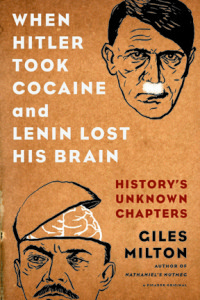By Terri Schlichenmeyer
 The Bookworm Sez, LLC “When Hitler Took Cocaine and Lenin Lost His Brain”
The Bookworm Sez, LLC “When Hitler Took Cocaine and Lenin Lost His Brain”
by Giles Milton c.2016, Picador $16.00 / higher in Canada 272 pages
What’s done is done. You can’t go back and erase the past, as much as you might try. You can alter its affects, make excuses for it, or pretend it never happened, but what’s done is done. And as you’ll see in the new book “When Hitler Took Cocaine and Lenin Lost His Brain” by Giles Milton, more was done than you think. Every good historian knows that history’s filled with dates, battles, and facts that can be mind-numbing for the average person. Those are things your high school history teacher tried to make you memorize – but there’s a lot that textbooks never tell. Did you know, for instance, that Adolph Hitler might’ve had a love child that would “quite possibly still” be alive? Or that Hitler’s brother joined the U.S. Army in World War II and fought against the Germans? There are things in history that we know, almost. A corpse’s clues suggest how explorer George Mallory died, but nobody knows if he made it to the top of Everest. After the Titanic sank, a kitchen worker survived hours in icy water, perhaps due to the two bottles of whiskey he drank earlier. And that Agatha Christie disappeared for eleven days is a fact; why is her biggest mystery. But unknowns aren’t the only surprises from the past: in this book, you’ll read about history’s “most prolific murderess” and a monk that wouldn’t die. You’ll learn about a nine-year-old who dedicated his life to an Emperor in a very drastic way, and you’ll see stories of the most unsavory meals… And then there are history’s little-known but astounding people: the man who survived two hydrogen bomb-drops and lived to be ninety-three. The captain who chose cash over “chattels” at sea. Men who talked in code to foil the Japanese. And the Polish Catholic woman who single-handedly saved more than 2,000 Jews. There’s a lot of good reading inside “When Hitler Took Cocaine and Lenin Lost His Brain.” And a lot of fun, too. Half the enjoyment in this book comes from the quick, short tales that author Giles Milton has collected: tales that lean heavily toward World War II, but are still varied throughout history and the world. The length of these stories is perfect for this kind of book: each can be read in a few minutes’ time and you won’t feel guilty for jumping in, mid-book, for a good-at-the-moment browse. The other great thing is that Milton invites readers to look at the past with curiosity and even a little humor. While it’s true that some of the chapters you’ll read here are made of serious stuff, Milton also includes stories that are on the lighter side. I enjoyed this book with the consternation that comes when you know something’s going to end, but you don’t want it to – and that’s the feeling I think you’ll get, too, when you read “When Hitler Took Cocaine and Lenin Lost His Brain.” Start this book, and you’ll want more when it’s done. •







